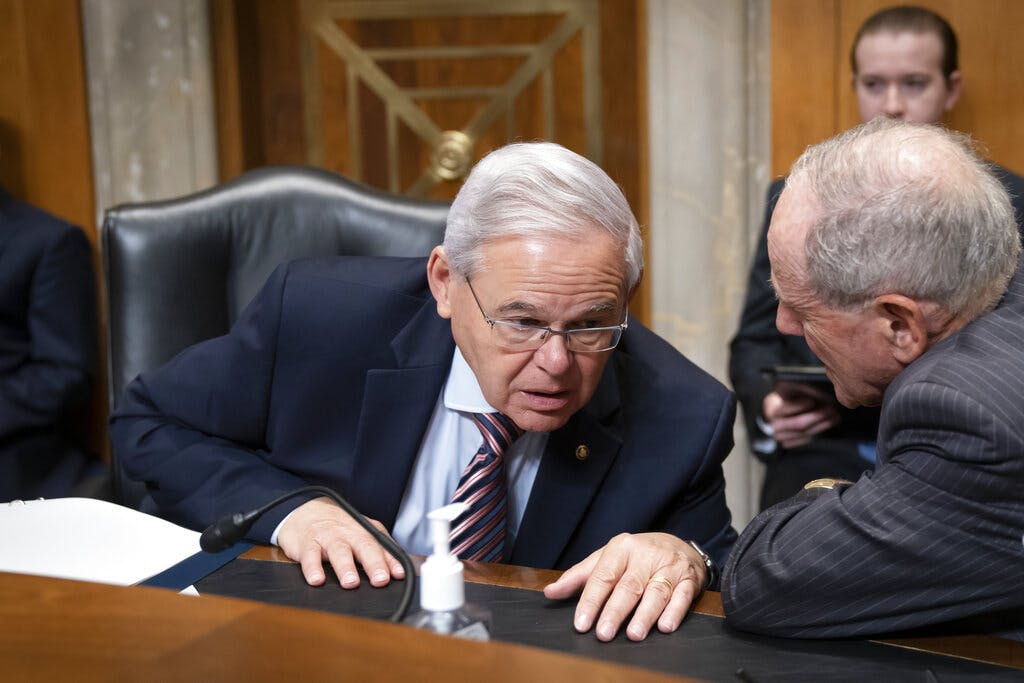State Department Clings to Diplomacy on Iran Deal, Even as the UN and Congress Are Begging To Differ
‘Hope is not a national security strategy,’ Senator Menendez says.

Although the State Department insists diplomacy remains the best way to curb Iran’s nuclear ambitions, a United Nations nuclear watchdog, the United States Congress, and facts on the ground beg to differ.
In a new report leaked to the press yesterday, the Vienna-based International Atomic Energy Agency assesses that the Islamic Rpublic’s stockpiles of highly enriched uranium has grown to roughly enough material for an atomic bomb.
That assessment gets Tehran closer to a nuclear threshold state — a term used to describe countries that do not yet possess an atomic weapon but can attain it the moment they decide to do so with actions akin to flipping a light switch.
In a separate report, the IAEA describes the various ways in which Iran is blocking inspections, including by refusing to explain traces of uranium the agency collected from at least three undeclared sites.
Prime Minister Bennett yesterday posted on his public social accounts several Farsi-language documents obtained by Israel. Iranian spies, he said, managed to steal those secret IAEA documents and add notes in their margins. Understanding the IAEA’s methods, as described in the stolen documents, helped Iran evade inspection.
Meanwhile, America, Britain, France, and Germany plan, in the June meeting of the directors of the 35-member IAEA, to rebuke Iran for non cooperation with the agency, according to a draft resolution obtained by Reuters. Such drafts, however, normally go through several edits that, based on objections from board members, could determine how strong the rebuke would end up being, if at all.
“We work very closely as a partner with the IAEA to support its activities,” the State Department’s spokesman, Ned Price, said yesterday. Yet, America in March nixed a proposal to condemn Tehran after an inspection report detailed its refusal to cooperate with inspections.
Back then Washington harbored high hopes for a diplomatic breakthrough in talks to renew the 2015 Iran deal. Since March, though, talks have been suspended, as Iran conditioned a return to the deal, known as the Joint Comprehensive Plan of Action, on removal of its terrorist arm, the Revolutionary Guards, from America’s list of terrorist organizations.
Despite the snag Washington has to date declined to present an alternative to the 2015 deal. “The pursuit of a mutual return to compliance with the JCPOA will continue to be our policy goal as long as it is in our national interest to do so,” Mr. Price said yesterday.
Congress is getting impatient. A bipartisan group of senators says that pursuing a renewal of the JCPOA is no longer in America’s national interest. Instead, some advocate pulling the plug on indirect negotiations with Iran, which America has conducted through European and even Russian intermediaries.
“It is time to tell the Europeans, who we have shown good faith with, that we were willing to enter into what was hopefully a stronger and longer deal, that the Iranians are not there,” the Democratic chairman of the Senate Foreign Relations Committee, Senator Menendez, said yesterday.
In Antony Blinken’s confirmation hearing, the future state secretary promised that America would pursue a “stronger and longer” deal to address issues missing from the 2015 pact.
Those issues could include Iran’s ballistic missile development, its regional aggression, the expiration dates of several restrictions that are contained in the JCPOA, and conceivably even the mullahs’ repression of the Iranian people. Instead of America seeking to strengthen the deal, however, Tehran is raising several stumbling blocks on the path to its renewal.
Negotiations are currently in hiatus while Iran is amassing enough fissile material for a bomb, as the IAEA report notes. Yet, President Biden clings to the hope that his campaign promise of the deal’s renewal could be fulfilled.
“Hope is not a national security strategy,” Mr. Menendez told the New Jersey chapter of the American Israel Public Affairs Committee yesterday. According to an account of his speech on JewishInsider.com, Mr. Menendez urged the administration to “move forward.”
“In the absence of hearing a plan in a classified setting,” the New Jersey senator told AIPAC, his committee will pass “legislation that will ultimately dictate what a plan should be.”
Yet, it may be difficult for Congress, short of a war declaration, to force a president to change course while he is intent on proving that his diplomatic prowess can do the job. For now, then, the only alternative for Washington’s failed diplomacy is Israel’s sabotage operations inside Iran.
“We are employing various activities to prevent Iran from becoming a nuclear power,” a former chief of staff of the Israeli Defense Force, Lieutenant Colonel (Retired) Gadi Eizenkot said today. Without those mostly clandestine operations, he added, “I suppose Iran would have become a nuclear state seven or 10 years ago.”

